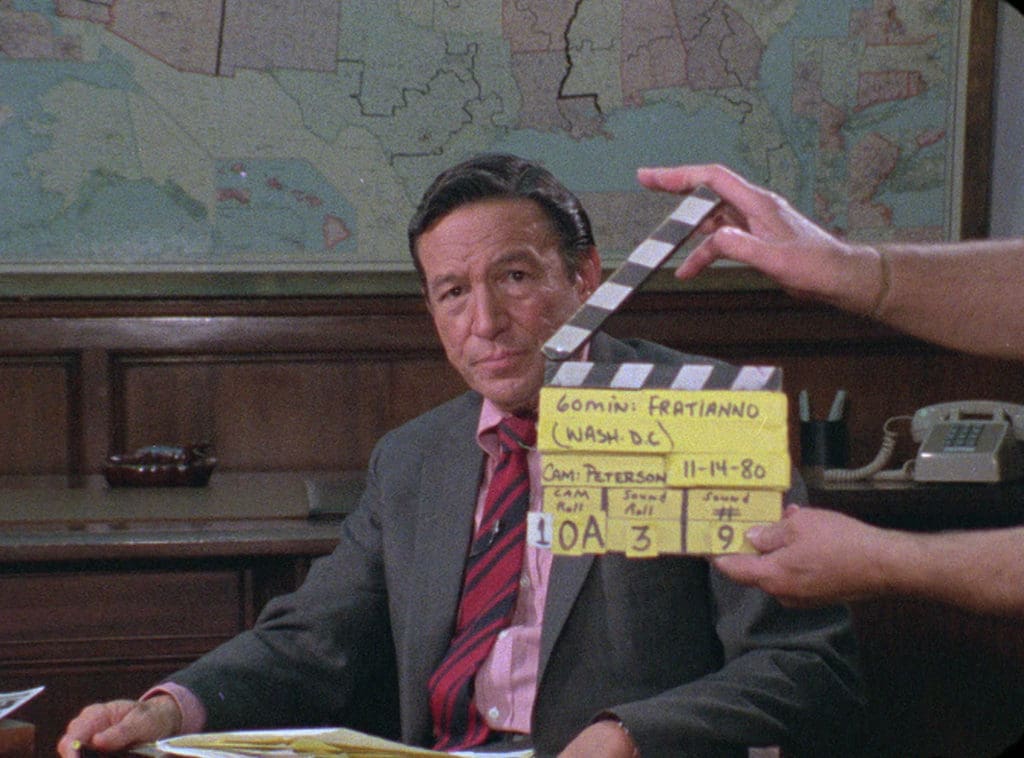
The new documentary, Mike Wallace is Here, begins with the titular journalist interviewing Bill O’Reilly. Wallace asks him the appeal of Fox News and O’Reilly responds, “People in America are desperate for straight talk.” Wallace begins to criticize O’Reilly’s confrontational interviewing style, but O’Reilly quickly cuts him off saying, “you’re the driving force behind my career.” Though we see Wallace’s face as he takes in that statement, he never responds directly to that assertion—so director Avi Belkin does it for him. Purely through archival footage including interviews both with and by Wallace, Belkin explores not only Wallace’s legacy, but his story.
Belkin and editor Billy McMillin start by quickly moving through the early stages of Wallace’s life, from his upbringing in Brookline, Massachusetts to his time working in radio on various shows including the Green Hornet. It’s brilliant editing and Belkin and McMillin’s skill at synthesizing all that information not only keeps the film moving, but gives viewers not already familiar with Wallace much needed context. That’s especially true in the section exploring Wallace’s time on Night Beat, where he first began developing the aggressive interviewing style that would eventually become his trademark. Watching him interview the grand wizard of the KKK or gangster Mickey Cohen, Wallace’s skill is both undeniable and refreshing despite how ubiquitous that style eventually became.
So, it’s all the more disappointing when when the show is quickly cancelled due to libel lawsuits filed in response to his interviews and Wallace is forced to go back into entertainment. “I was a little sensitive about being a Jack of All Trades,” confesses over footage of his time as a game show host and shilling cigarettes and it’s a relief when he becomes host of 60 Minutes in 1968. That said, while watching Wallace’s career progress is fascinating for both those familiar with his career and those relatively unfamiliar with his involvement in Watergate reporting or Vietnam coverage, some of the film’s best moments come when Belkin uses Wallace’s interviews with other prominent figures to express the interviewer’s own emotional state.
There’s the striking scene when Johnny Carson says that his similarly tough interviewing style is part performance and Wallace nods in agreement. There’s the moment when Kirk Douglas says his toughness and work ethic is driven by insecurity and Belkin draws a parallel to Wallace’s fear that his history in entertainment undercuts his legitimacy as a news man. Most striking of all, though, is the section of an interview with Leona Helmsley, in which Wallace’s question about the sudden death of Helmley’s only son, Jay, causes her to dissolve into tears. Wallace’s sympathy in that moment is unexpected, but Belkin quickly contextualizes it, showing Wallace struggling to answer questions about his own son’s untimely death through the years, each response more composed than the last.
It’s an incredible bit of editing, but part of what makes that section stand out is that it’s an exception because of how rarely Wallace seems willing to get personal. When he’s is asked about how many marriages he’s had early in the film, Wallace argues that the question has no merit and Belkin leaves it at that, never adding in a title card or interview with another person to answer that question. On one hand, the choice is audacious. Belkin is using this footage to essentially recreate what an interview of Wallace would look like now and it’s entirely possible Wallace wouldn’t answer the question. However, by sticking so closely to that structure, Belkin can only go so far in questioning one of the most contentious periods of Wallace’s career, when 60 Minutes suppressed an interview with Jeffrey Wigand, a whistleblower on the tobacco industry.
Director Michael Mann’s 1999 film, The Insider, dramatized the incident and painted a pretty negative picture of Wallace’s integrity in the process. Both Wallace and producer Lowell Bergman expressed dissatisfaction with they were portrayed in the film at the time and it’s surprising to see Belkin leave the film unaddressed here. Rather, Wallace is only ever portrayed as being vehemently against folding to corporate fears of lawsuits and disappointed when CBS caves to pressure. While that version of the story may very well be the truth, it’s difficult to really make that judgement without more perspectives on the incident that either support or refute Wallace’s own assertions.
Early in Mike Wallace is Here, someone asks Wallace if he’d like to be interviewed the way he interviews everyone else and his response is unequivocal: no. Though Wallace is no longer around to be interviewed, Belkin nearly does it anyway. Sure, his film may occasionally be hamstrung by his commitment to that archival footage conceit, but it’s also frequently brilliant and endlessly engaging. Wallace may not have wanted to be interviewed the way he interviewed others, but in true Wallace fashion, Belkin doesn’t give him a choice and the result is just as thrilling as Wallace’s best work.

